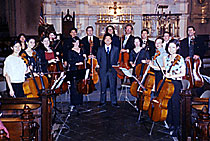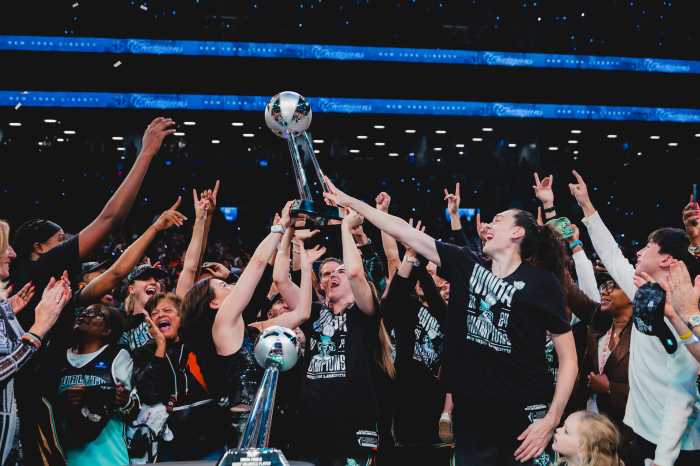One World Symphony’s first "Cellobration"
was such a big hit last fall that it is being revived as an annual
event, according to artistic director, founder and conductor
Sung Jin Hong.
"The first ’Cellobration’ was very popular and well-received,
both from our cellists and our audiences," Hong told GO
Brooklyn. "A lot of our audience members actually e-mailed
us to see if we were going to program another cello concert.
The Villa-Lobos piece (’Bachianas Brasileiras No. 5’) got such
an ovation that we repeated it. Also, you don’t get to perform
with 16 great cellists at the same time too often, so it was
amazing just for that."
For One World Symphony’s second "Cellobration" (Dec.
3 at the Church of St. Ann and the Holy Trinity in Brooklyn Heights),
Hong and One World Symphony are giving their audiences more of
what worked so well last time: Bach; the Brazilian, Heitor Villa-Lobos;
and two local premieres.
"And most of the cellists are coming back, too," said
Hong.
But the program is built around Bach.
"The big tree trunk is Bach, and then you have all these
other branches, which are the other composers [we’re playing],"
said Hong. "Bach is the one composer who really inspired
Villa-Lobos, and Villa-Lobos inspired [Gaspar] Cassado, while
Stanley Grill is a fascinating composer with Latin elements in
his music."
One World Symphony’s concert begins with Bach’s "Chaconne"
– a movement from his Partita No. 2 for unaccompanied violin,
arranged for cello orchestra by Laszlo Varga – which is one of
his most emotional and joyous pieces.
"Bach’s ’Chaconne’ is such a monumental piece that many
composers have transcribed it and arranged it for various instruments,
like [Ferruccio] Busoni’s massive Wagnerian arrangement for piano,"
Hong noted. "I’ve even heard a rock band version.
"There are so many composers, even today, who are so inspired
by this piece," he said. "It’s transcendent. It goes
way beyond the notes, and it has a real depth. I truly believe
that this is music that takes us all on a meaningful journey.
The cellists are more excited about playing this than anything
else on the program."
Following the Bach work comes Villa-Lobos’ "Bachianas-Brasileiras
No. 1." As its very title indicates, it was one of 11 pieces
the Brazilian master wrote in homage to the composer he revered
among all others, Bach.
"These 11 works are written for solo instruments, chamber
ensembles and full orchestras; and there are two that are written
for cello orchestra, numbers 1 and 5," Hong explained. "The
one we’re playing is directly inspired by Bach. No. 1’s last
movement is a fugue. You have eight different parts talking together,
just like an extensive Bach fugue – and Bach was the father of
the fugue."
"[Villa-Lobos’] first movement clearly depicts his own Latin
background with this heartbeat Latin rhythm," he continued.
"He wants to make a statement, right in your face, right
off the bat. So playing this is a perfect fit for us."
"Suite for Cello," by Spanish composer Gaspar Cassado,
is next on the program.
"I was thinking about programming a Bach cello suite, but
then I thought it was more adventurous to do this," Hong
admitted. "Cassado’s suite is directly related to the Villa-Lobos
piece; it also has three movements, and it ends with a Bach-like
fugue."
The closing work of this season’s "Cellobration" is
written by One World Symphony’s resident composer, Stanley Grill.
His "Vignettes – Winter Trees" is scored for two cellists
and two mezzo-sopranos.
"[Grill] originally wrote it for two bass voices and two
cellists, but I suggested he change it [to mezzos] because I
thought those two pairs would compete," said Hong. "It’s
a work in progress: he’s writing 10 movements in total, and we’re
performing four of the movements.
Grill’s "Vignettes – Winter Trees" is a setting of
poems by William Carlos Williams.
"There are layers of meaning in the poems that you can interpret
so many ways," said Hong. "From my experience, the
poems are visually compelling; just physically the way Williams
laid out his poems can be interpreted in many different ways."
Hong acknowledged that a song cycle written without any piano
accompaniment is a daring choice.
"Getting rid of the keyboard instrument limits the composer,"
he says. "Now it’s basically a quartet for four solo voices
– and the two cellists are voices without words. The cellos lay
down the texture and the overall feeling of the poem, while the
singers express the text. It’s actually quite innovative."
One World Symphony’s "Cellobration"
program will be performed Dec. 3 at 8 pm at the Church of St.
Ann and the Holy Trinity, located at the corner of Montague and
Clinton streets in Brooklyn Heights. Tickets are $20, $10 for
students. An open rehearsal takes place at St. Ann on Dec. 1
at 6 pm; tickets are $5. For more information, log onto www.oneworldsymphony.org
or call (718) 462.7270.

























